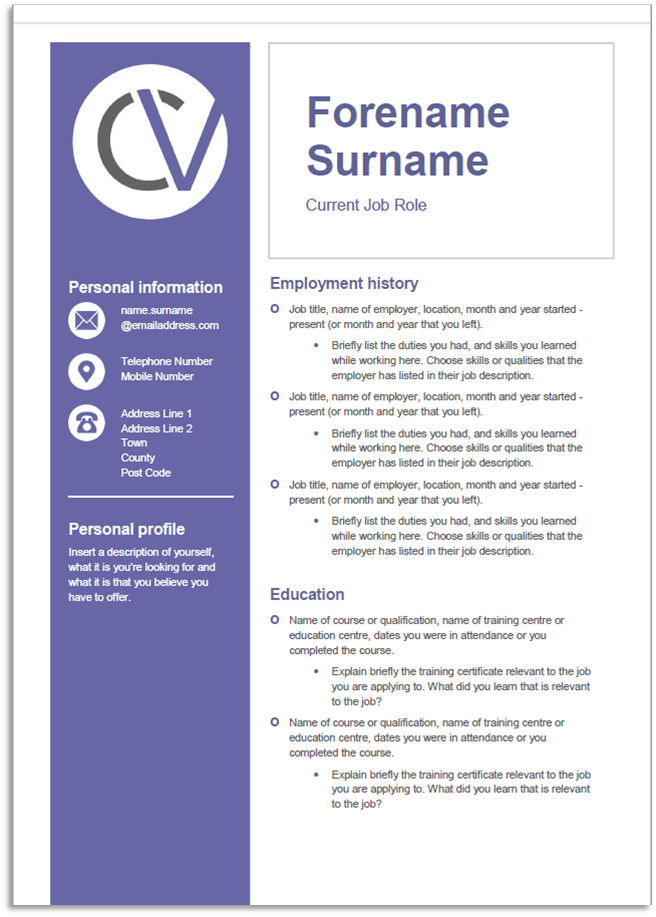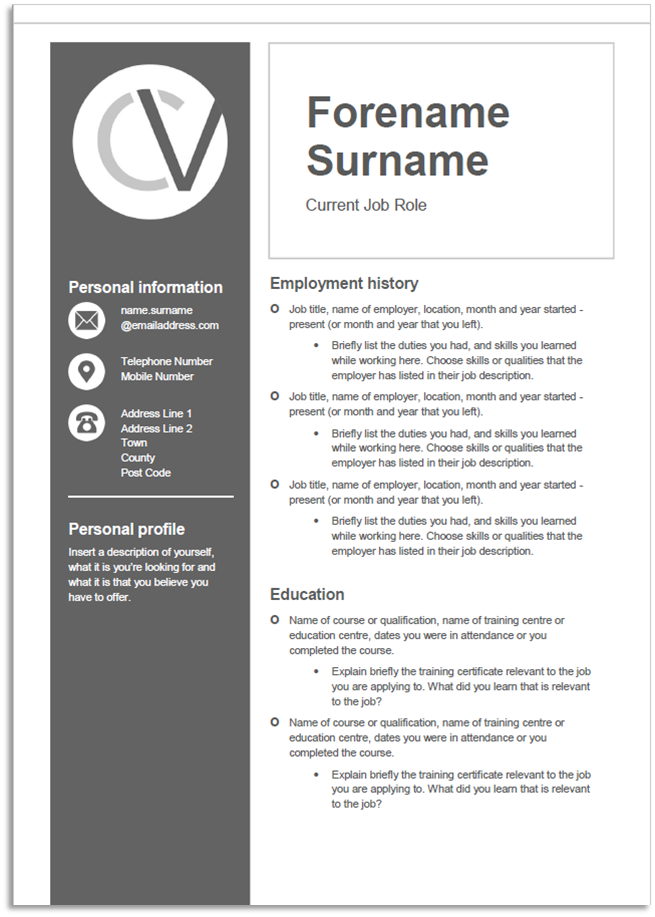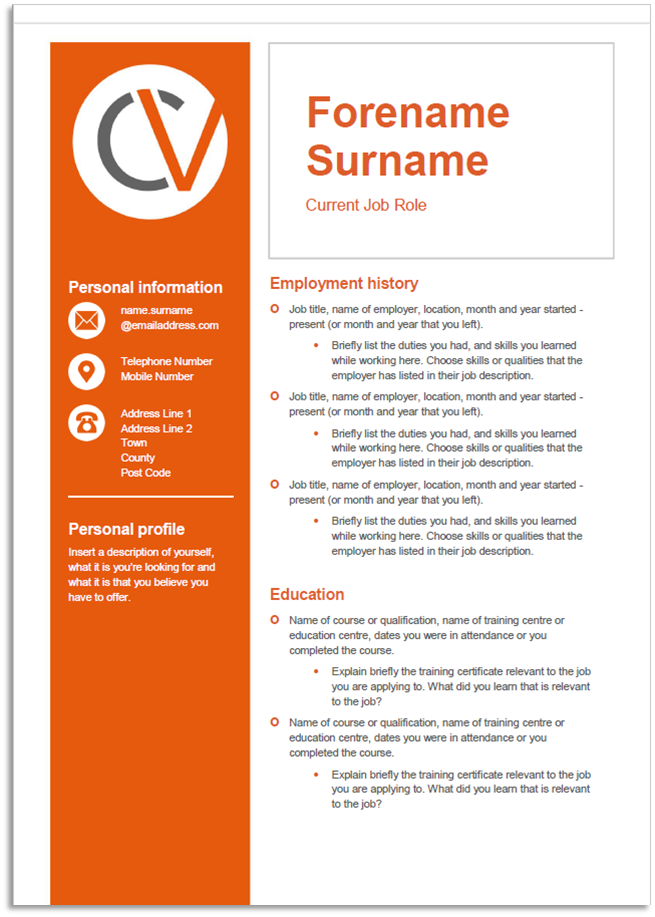A Receptionist is the face of the company, and the first person a customer, colleague or visitor will meet. To land a job as a receptionist, it’s important that your CV shows that you have a passion for customer service, have excellent communication skills and able to multi-task.
Whether you're looking to start your career as a Receptionist or looking for a new challenge in the hospitality and catering sector, our free CV template is tailored to ensure your CV stands out from the crowd.
A guide to writing a CV for a job as a Receptionist
Name: Tia Hurst
Tel No: 0000 0000 00
Email: TiaHurst@email.com
Address: 25 Huntly Street
Ampthill
MK56 4UN
Personal Profile
The personal profile is your chance to professionally introduce yourself, in three or four sentences, with relation to the job you’re applying to.
You should try to include: your current work situation, what type of work you are searching for (such as part-time, flexible hours, or full-time employment starting immediately) some key skills and/or traits that will show the potential employer that you are a good candidate for the advertised job. For example, if you have previous experience of working as a receptionist and have any qualifications specifically in administration, mention this here.
EXAMPLE:
I am a highly organised individual with great communication and interpersonal skills, and have two years’ experience working as a receptionist. I enjoy a varied and busy workday, and have good literacy and computer skills.
Work History
Use the work history section to highlight the skills and experience your previous jobs have given you. You don’t need to include every last detail, just pick the best parts that are relevant to the job you're applying to. You can always write down and save further examples or other relevant skills for the interview.
- Job title, name of employer, location, month and year started – present (or month and year that you left)
- Briefly list the duties you had, and skills you learned while working here. Choose skills or qualities that the employer has listed in their job description
EXAMPLE:
- Receptionist, Central Beds Council, Chicksands, October 2017 – present
- Working on the front desk of the building, I greet all staff and customers. I receive and log deliveries, and answer all phone calls through the main switchboard. I am also responsible for managing meeting room diaries and set up.
What jobs should you include?
- Try to include your work history for the last five years. If you haven’t been working for that long, that is okay. It will be explained by the education history. If you have recently moved to the country, it’s okay to include employment in other countries.
- Any jobs you’ve had in the administrative and secretarial sector will be useful to include here as lots of the skills will overlap and show you’re a good candidate for the role.
- If you have recently left education, or are new to this type of work, try to include any jobs you’ve had that will highlight the skills the employer is looking for. For example, if you have worked on the reception desk in a school, use this to show that you have developed a good telephone manner, paperwork organisation and the ability to prioritise your workload.
Education History
In education history,show any relevant training you have completed. List what skills you have learned from your courses, as well as general education subjects you’ve completed. As you get more work experience, this section will become shorter, as your work history becomes more relevant and more recent.
There are no formal qualifications required for most receptionist roles. However, some do require specialist knowledge and training such as medical or legal receptionists, to ensure they can complete technical responsibilities that go with that role. Any formal business related qualifications should be listed here as they will help your application.
If you have completed courses or gained certificates in other work-related areas, or first aid, include that information here also.
- Name of course or qualification, name of training centre or education centre, dates you were in attendance or you complete the course
- Explain briefly the training certificate relevant to the job you are applying to. What did you learn that is relevant to the job?
EXAMPLE:
- Microsoft Office Plus Diploma, Pittman Training, Watford, August 2016
- Covered the key areas of MS packages including word, outlook, excel, powerpoint and access, as well as two elective courses in excel expert and effective business communication
Skills
Here is your chance to highlight the best skills you have in relation to the job you’re applying for. Hint: these will be the skills listed in the job advert, but only highlight the skills you have. Misleading information on your CV is likely to trip you up in an interview and is unprofessional; you don’t have to show you have every last skill listed in the job advert to be successful.
EXAMPLE:
- Working independently – ‘In my current role I have learned to effectively prioritise tasks and manage my own workload. Ensuring I deal with customer enquiries in a timely way, and supporting staff with administrative duties and meetings.’
- Communication skills – ‘I have also been focusing on improving my communications skills. This is equally as important over the phone, in person or in writing. I have also been focusing on my listening skills to ensure all information is understood before responding.’
References
First and last name
Job title and relation to you in the work place (if it isn’t obvious from the job title), name of work place, work contact number (or main company phone number which they can be reached through) and work email address.
EXAMPLE:
David Jones
Manager at Central Beds Council, Chicksands
0000 0000 00
DavidJones@email.com
Who should you include as a reference?
- Your first reference should ideally be from a senior colleague or manager who you’ve been working closely with in your most recent role. The second reference can be from a current colleague, or line manager or supervisor from a previous job. It’s best practice to ask someone if they will be a reference for you before they are contacted. Be aware that not all employers actually contact references, but it’s important to have them available if needed
- It’s important to remember that while you are in your current job, consider that you may not want your reference (eg. your current boss) to be contacted until you have had an interview for a new possible job, or are actually offered it. This is because, for instance, if you weren’t offered the new job, and end up staying in your current job then you might not want your manager having been contacted as a reference. It can cause tension or awkward conversations about why you were trying to leave. A good way to get around this is to simply write ‘References available on request’. This shows the new employer that they can ask you for them as needed, but also means you can ask them to only contact them if you are offered the job, and then have time to ask the reference if it’s okay for them to be contacted. Most potential employers will be happy to wait to do this after offering you the job.
- If you have only had one previous job, or have been studying, it is okay to include a tutor as a reference, or someone else as a character reference (who is not related to you)











